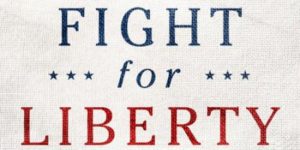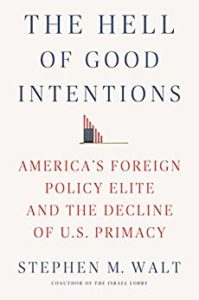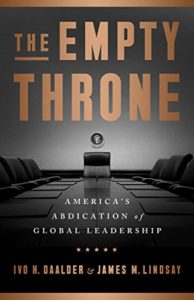 Robert Kagan, the author of “The Jungle Grows Back; America and Our Imperiled World,” offers a bleak vision, The Economist notes. Even if Mr Kagan underestimates the power of an idea to stir people—as liberal democracy did in eastern Europe during the cold war—he is right to detect a crisis of confidence in the democratic world.
Robert Kagan, the author of “The Jungle Grows Back; America and Our Imperiled World,” offers a bleak vision, The Economist notes. Even if Mr Kagan underestimates the power of an idea to stir people—as liberal democracy did in eastern Europe during the cold war—he is right to detect a crisis of confidence in the democratic world.
The old consensus about America’s role as upholder of global security has collapsed in both parties, Kagan writes for The New York Times. The three pillars of the ‘America First’ ideology — isolationism, protectionism and restricting immigration —may outlast the current US administration, he suggests:
In retrospect it’s pretty clear that Mr. Obama was too internationalist for his party base. He expanded NATO, intervened in Libya, imposed sanctions on Russia and presided over the negotiation of the Trans-Pacific Partnership. Democrats may miss Mr. Obama for many reasons, but there’s little evidence that the rank-and-file miss those policies. Mr. Trump’s narrower, more unilateralist and nationalist approach to the world is probably closer to where the general public is than Mr. Obama’s more cosmopolitan sensibility.
Kagan thinks that without America’s management, the world faces what the State Department in 1945 called “power politics pure and simple”. Unstable spheres of influence and mutual suspicion will ensue, The Economist adds.
 “We do not face a choice between good and bad but between bad and worse,” he writes. “It is between maintaining the liberal world order, with all the moral and material costs that entails, or letting it collapse and courting the catastrophes that must inevitably follow.”
“We do not face a choice between good and bad but between bad and worse,” he writes. “It is between maintaining the liberal world order, with all the moral and material costs that entails, or letting it collapse and courting the catastrophes that must inevitably follow.”
As the US retreats the rest of the world is returning to its natural, Hobbesian state, Kagan contends.
“The crucial issue is not the Middle East or even Russia, and it may not even be China. The big game is what it’s been for over a century. If we lose Europe, if we send Europe back to its normal condition, it’s over,” he tells The New York Times:
 Stephen M. Walt of Harvard University argues in his own forthcoming book, “The Hell of Good Intentions: America’s Foreign Policy Elite and the Decline of U.S. Primacy,” that the United States should do less in the world, and a lot more selectively….“If we go running around the world on idealistic crusades, and some go badly, as they will, then public support for an activist foreign policy will decline.”
Stephen M. Walt of Harvard University argues in his own forthcoming book, “The Hell of Good Intentions: America’s Foreign Policy Elite and the Decline of U.S. Primacy,” that the United States should do less in the world, and a lot more selectively….“If we go running around the world on idealistic crusades, and some go badly, as they will, then public support for an activist foreign policy will decline.”
Tomas Valasek, who runs Carnegie Europe, a research institution, considers that view too pessimistic. “I agree that it’s not inevitable that the U.S. will always play the same role, but I disagree that mayhem necessarily follows,” he said. “The U.S. has changed Europe’s security culture,” making Europeans more conscious of the need to defend themselves.
If we accept that international orders will reflect the domestic values of the great powers that sustain them, what kind of alternative would we like to see? asks Doug Stokes, a professor in international security and strategy in the Department of Politics at the University of Exeter. Kagan’s key message is that if you want peace, prepare for war, he writes for Quillette:
 Human existence “is a constant battle among competing impulses—between self-love and the love of others, between the noble and the base, between the desire for freedom and the desire for order and security—and because those struggles never end, the fate of liberalism and democracy in the world is never settled. It is an illusion to believe that the present democratic age is eternal rather than transient, or that it can survive without constant tending and constant defense.”
Human existence “is a constant battle among competing impulses—between self-love and the love of others, between the noble and the base, between the desire for freedom and the desire for order and security—and because those struggles never end, the fate of liberalism and democracy in the world is never settled. It is an illusion to believe that the present democratic age is eternal rather than transient, or that it can survive without constant tending and constant defense.”
Daniel W. Drezner, who teaches international politics at Tufts University’s Fletcher School, argues that “Americans are sick of wars in Afghanistan and Iraq,” but both Mr. Kagan and Mr. Walt are wrong about American public opinion, he tells The Times:
“Ask them about trade, immigration and alliances, and it turns out that Trump has made liberal internationalism great again,” he said, with Americans favoring international trade and alliances with European and Asian democracies.
 Indeed, surveys show that American attitudes on trade and mutual alliances are the most positive in 40 years, said Ivo H. Daalder, president of the Chicago Council on Global Affairs, and co-author with James M. Lindsay of the forthcoming book, “The Empty Throne: America’s Abdication of Global Leadership.” America’s nine most democratic allies can do more to preserve the liberal world order — in both global trade and security, Lindsay and Daalder contend, calling for a “G-9” of Britain, France, Germany, Italy, Australia, South Korea, Japan, Canada and the European Union to act more boldly.
Indeed, surveys show that American attitudes on trade and mutual alliances are the most positive in 40 years, said Ivo H. Daalder, president of the Chicago Council on Global Affairs, and co-author with James M. Lindsay of the forthcoming book, “The Empty Throne: America’s Abdication of Global Leadership.” America’s nine most democratic allies can do more to preserve the liberal world order — in both global trade and security, Lindsay and Daalder contend, calling for a “G-9” of Britain, France, Germany, Italy, Australia, South Korea, Japan, Canada and the European Union to act more boldly.
But Kagan remains pessimistic.
“Many foreign policy experts, and most of the foreign leaders pouring into New York this week for the United Nation’s General Assembly….may have to start facing the fact that what we’re seeing today is not a spasm but a new direction in American foreign policy,” Kagan adds, “or rather a return to older traditions — the kind that kept us on the sidelines while fascism and militarism almost conquered the world.”
A new volume of essays Fight for Liberty is a roadmap for the struggle against the rising tide of extremism and a cri de coeur in defense of the liberal world order, The Carnegie Council adds.







